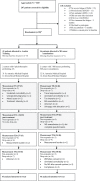Does aerobic training alleviate fatigue and improve societal participation in patients with multiple sclerosis? A randomized controlled trial
- PMID: 28528566
- PMCID: PMC5624301
- DOI: 10.1177/1352458517696596
Does aerobic training alleviate fatigue and improve societal participation in patients with multiple sclerosis? A randomized controlled trial
Abstract
Background: Evidence supporting the effectiveness of aerobic training, specific for fatigue, in severely fatigued patients with multiple sclerosis (MS) is lacking.
Objective: To estimate the effectiveness of aerobic training on MS-related fatigue and societal participation in ambulant patients with severe MS-related fatigue.
Methods: Patients ( N = 90) with severe MS-related fatigue were allocated to 16-week aerobic training or control intervention. Primary outcomes were perceived fatigue (Checklist Individual Strength (CIS20r) fatigue subscale) and societal participation. An improvement of ⩾8 points on the CIS20r fatigue subscale was considered clinically relevant. Outcomes were assessed by a blinded observer at baseline, 2, 4, 6 and 12 months.
Results: Of the 89 patients that started treatment (median Expanded Disability Status Scale (interquartile range), 3.0 (2.0-3.6); mean CIS20r fatigue subscale (standard deviation (SD)), 42.6 (8.0)), 43 received aerobic training and 46 received the control intervention. A significant post-intervention between-group mean difference (MD) on the CIS20r fatigue subscale of 4.708 (95% confidence interval (CI) = 1.003-8.412; p = 0.014) points was found in favour of aerobic training that, however, was not sustained during follow-up. No effect was found on societal participation.
Conclusion: Aerobic training in MS patients with severe fatigue does not lead to a clinically meaningful reduction in fatigue or societal participation when compared to a low-intensity control intervention.
Keywords: Multiple sclerosis; exercise therapy; fatigue; randomized controlled trial; rehabilitation.
Conflict of interest statement
Figures


Comment in
-
Aerobic exercise, cognitive behavioural therapy and energy conservation management for multiple sclerosis (MS) fatigue: Are three trials better than one?Mult Scler. 2017 Oct;23(11):1436-1440. doi: 10.1177/1352458517731159. Mult Scler. 2017. PMID: 28949284 No abstract available.
References
-
- Compston A, Coles A. Multiple sclerosis. Lancet 2008; 372: 1502–1517. - PubMed
-
- De Groot V, Beckerman H, Twisk JW, et al. Vitality, perceived social support and disease activity determine the performance of social roles in recently diagnosed multiple sclerosis: A longitudinal analysis. J Rehabil Med 2008; 40: 151–157. - PubMed
-
- Multiple Sclerosis Council for Clinical Practice Guidelines. Fatigue and multiple sclerosis: Evidence-based management strategies for fatigue in multiple sclerosis. Washington, DC: Paralyzed Veterans of America, 1998, http://www.pva.org/atf/cf/{CA2A0FFB-6859–4BC1BC96–6B57F57F0391}/fa...
-
- Chaudhuri A, Behan PO. Fatigue in neurological disorders. Lancet 2004; 363: 978–988. - PubMed
Publication types
MeSH terms
LinkOut - more resources
Full Text Sources
Other Literature Sources
Medical

